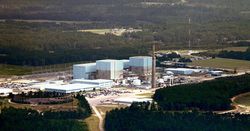Fires break out at three U.S. nuclear plants over the weekend
 Emergencies were declared at two Progress Energy nuclear power plants in the Carolinas over the weekend due to fires. There was also a fire at a nuclear power plant in Ohio on Sunday that sent two firefighters to the hospital.
Emergencies were declared at two Progress Energy nuclear power plants in the Carolinas over the weekend due to fires. There was also a fire at a nuclear power plant in Ohio on Sunday that sent two firefighters to the hospital.
The blazes were put out and disaster averted, but the incidents underscore concerns about U.S. nuclear plants' failure to comply with fire safety regulations.
The first incident happened on Friday night at the Brunswick plant near Wilmington, N.C. At about 10:45 p.m., a fire broke out in the turbine building on the plant's non-nuclear side, burning for more than 15 minutes. Plant personnel determined that the fire was caused by electric blankets used for post-weld heat treatments, fueled by tape used to hold the blankets together.
There were no injuries or damage to plant equipment, according to an official report filed by the company with the Nuclear Regulatory Commission.
Another pair of fires was reported at Progress Energy's Robinson nuclear power plant near Hartsville, S.C. on Sunday evening on the plant's non-nuclear side.
The first blaze there reportedly broke out shortly before 7 p.m. in an electrical breaker, causing the reactor and turbine to shut down. That fire was extinguished, but a subsequent blaze in another electrical breaker near the first one resulted in the declaration of an alert due to safety systems being affected. That fire was extinguished shortly after 11 p.m., according to the company's report to the NRC.
"There was no explosion or steam line break," the company stated. The plant remains closed today.
Also on Sunday, fire broke out at Ohio-based FirstEnergy's Perry plant near Cleveland around 6 p.m. and burned for four hours, fed by oil in a water pump's lubrication system. Two members of the plant's fire brigade were hospitalized for heat stress, the Associated Press reports.
The emergencies "are a reminder that virtually all U.S. nuclear power plants remain in noncompliance with fire protection regulations," says Jim Warren, executive director of the N.C. Waste Awareness and Reduction Network, an energy watchdog group.
Fire represents the leading risk factor for a U.S. nuclear plant meltdown.
In 1975, a fire broke out at the Tennessee Valley Authority's Browns Ferry nuclear plant in Alabama in an area that housed electrical cables used to power critical safety equipment. The fire was sparked by personnel using candles to search for air leaks and caused significant damage to the plant -- but fortunately no release of radiation.
In response to the near-disaster at Browns Ferry, the NRC adopted fire-safety regulations designed to prevent similar incidents. However, most of the nation's commercial nuclear power plants still not have come into compliance with those regulations, according to reports by the NRC Inspector General and the U.S. Government Accountability Office.
(Photo of Progress Energy's Brunswick nuclear plant from Wikimedia Commons.)
Tags
Sue Sturgis
Sue is the former editorial director of Facing South and the Institute for Southern Studies.
